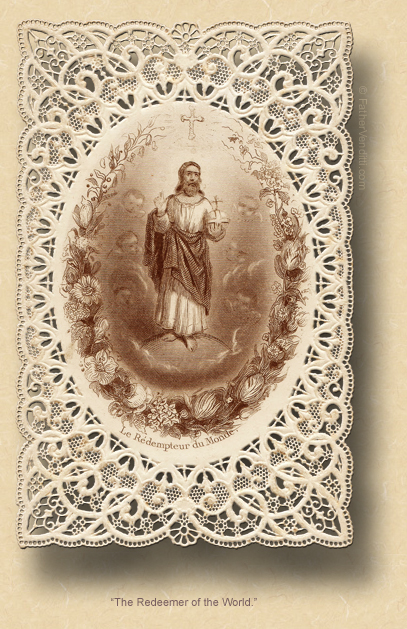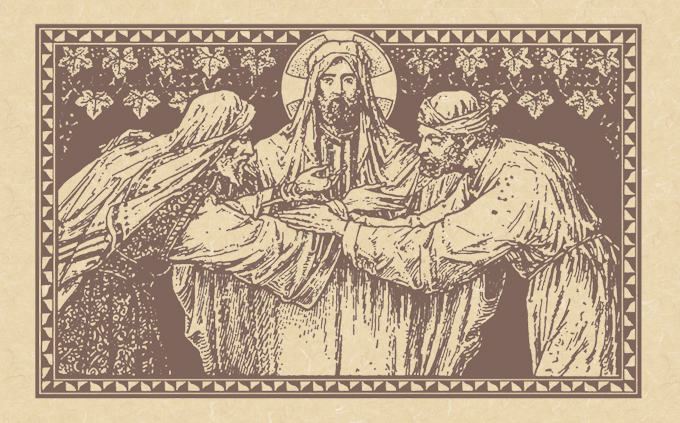The Hidden Cause of Our Sins: Loneliness.
The Sixth Wednesday of Lent; and, the Commemoration of Saint Vicent Ferrer, Priest.*
Lessons from the feria, according to the ordinary form of the Roman Rite:
• Daniel 3: 14-20, 91-92, 95.
• [Responsorial] Daniel 3: 52-56.
• John 8: 31-42.
Passion Wednesday; and, the Commemoration of Saint Vincent Ferrer, Confessor.*
Lessons from the feria, according to the extraordinary form of the Roman Rite:
• Leviticus 19: 1-2, 11-19.
• [Gradual] Psalm 29: 2-4.
• [Tract] Psalm 101: 10.
• John 10: 22-38.
The Sixth Wednesday of the Great Fast; and, the Feast of the Holy Martyrs Theodulus, Agathopodes & Their Companions.**
Lessons for the Presanctified Liturgy, according to the Ruthenian recension of the Byzantine Rite:***
• Genesis 43: 26-45.
• Proverbs 21: 23—22: 4.
FatherVenditti.com
|
 8:47 AM 4/5/2017 — As you can see, my jury duty has been completed early, so I’m able to be with you for the rest of this week. Don’t celebrate too loudly. 8:47 AM 4/5/2017 — As you can see, my jury duty has been completed early, so I’m able to be with you for the rest of this week. Don’t celebrate too loudly.
In the two days that I’ve been away, you’ve been hearing the Blessed Apostle John’s account of another of our Lord’s theological lectures, this one on the topic of redemption. It’s another of those words the meaning of which we all think we know, but don’t. Believe it or not, it’s not rooted in a Greek word, but in Latin, redimere, which literally means “to buy back.” To redeem means to set free by purchase or rescue. To redeem a prisoner means to pay a ransom for him so as to give him back his freedom. To free a slave, one would have to pay the owner of the slave and buy him. You can see why Saint John departs from his usual Greek to use this word, because it describes perfectly what Christ came to earth to do: to pay a ransom in order to purchase back our freedom. The ransom He pays is His death on the cross, but from whom is He buying us back? That’s easy, as our Lord tells us Himself in the heart of this Gospel lesson: “…Believe me when I tell you this; everyone who acts sinfully is the slave of sin…" (John 8: 34 Knox).
Of course, the fly in the ointment, so to speak, is that the prisoner or the slave whose freedom is being purchased must want to be freed. It seems silly to say that, since what prisoner or slave doesn’t want to be free? The answer is: many of us, because we often don’t know we’re not free, particularly when the one enslaving us is our own sin. This is particularly true of habitual sins with which we may have struggled for many years. It’s almost as if the sin has been with us so long that it becomes like a companion, comforting us with a kind of status quo. It’s analogous to the alcoholic who can’t envision himself getting through the day without a drink. There was a study done once—and if you were to ask me when or by whom I wouldn’t be able to remember—which posited that people who are promiscuous are not that way because their libido is overcharged, but because they are lonely.  Subconsciously, they crave some form of intimacy in their lives, but can’t find it, and turn to physical gratification thinking that this will ease their loneliness; only it doesn’t work, it only makes them more isolated. And this is true regardless of whether the sin is solitary or done with another. This is why there are so many people, whether cohabiting with someone or even married, who are desperately lonely. They’re in a physical relationship, but not a truly intimate one. For some reason, probably rooted in childhood, they lack the basic skills to relate to others in a truly intimate way. Subconsciously, they crave some form of intimacy in their lives, but can’t find it, and turn to physical gratification thinking that this will ease their loneliness; only it doesn’t work, it only makes them more isolated. And this is true regardless of whether the sin is solitary or done with another. This is why there are so many people, whether cohabiting with someone or even married, who are desperately lonely. They’re in a physical relationship, but not a truly intimate one. For some reason, probably rooted in childhood, they lack the basic skills to relate to others in a truly intimate way.
Every human person needs some form of intimacy in his or her life, whether married or single, priest or layman. Without it, we can be neither whole nor healthy in mind, and certainly not in spirit. Even the contemplative, locked away in his or her cell in a monastery, is intimately connected not only with the Lord, but also with every other struggling soul as he offers up his physical solitude for the good of all, and prays for them continually.
To become truly free, therefore, the first step is to recognize that we are, in fact, in prison, and it’s a prison of our own design. Even so, we cannot free ourselves. Overcoming sin, especially habitual sin, is never a matter of will power or fortitude; it’s more a matter of surrender, a matter of letting that part of us which is our own jailer to accept the ransom being offered. That doesn’t come easily when we’ve allowed ourselves to become so attached and accustomed to the prison walls surrounding us, allowing them to comfort us and maintain us in our isolation with a veiled and false familiarity. In other words, it’s all a matter of grace.
The Redeemer, the one offering to pay our bond, stands outside a door we ourselves have closed to keep Him out. It’s an odd jail in which we’ve locked ourselves, because it’s the only jail in which the prisoner has the keys. Our Lord has paid the bail, but we have to unlock the door and walk out. Regard well the Communion Antiphon from Colossians which we will pray together just before we come to receive: “God has brought us to the kingdom of His beloved Son, in Whom we have redemption through His Blood, the forgiveness of sins” (Col. 1: 13-14 RM3).

* Because Lent began on a Wednesday, today is the sixth Wednesday. Cf. the post here under the heading "Hey, aren't you off by a week?" for an explanation of how the days of the liturgical calendar are rendered on this site as opposed to how they are designated in the Roman Missal.
In the ordinary form during Lent, memorials automatically become commemorations, the observance of which is optional. If observed, only the Collect of the saint is used, with everything else taken from the feria. In the extraordinary form, third class feasts also become commemorations, with the commemoration made by an additional Collect, Secret and Postcommunion added to those of the feria. In both forms, the color of the season is worn.
Born in Valencia, Spain, in 1350, the Domincan Vincent Ferrer was a renowned preacher, missionary and professor of theology who worked tirelessly for the unity of the Church ripped apart, at that time, but the Great Western Schism. He converted thousands of Jews and Moors to the faith, and died in Brittany in 1419.
** Because the Great Fast began on a Monday, today is the sixth Wednesday.
Theodulus and Agathopodes died for the faith in Thessalonica toward the beginning of the fourth century. Some eastern Churches observe this feast on April 4th, combining it with those of our Holy Fathers George of Maleum and Joseph the Hymnographer, who were not martyrs, observing on the 5th that of the Martyrs Claudius, Diodorus, Victor, Pappius and Serapion, who all died in Corinth, none of whom appear in the Ruthenian typicon.
*** Cf. the second footnote to the post here for an explanation of weekday services in the Byzantine Tradition during the Great Fast.
|

